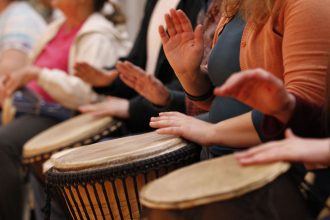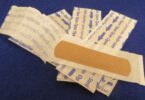By Sayer Ji
Contributing writer for Wake Up World
Drum Circle Classes Improve Parkinson’s Patients
A study published in the journal Movement Disorders Clinical Practice reveals that group drumming improves the condition of those with Parkinson’s disease; a condition considered by conventional medicine to be irreversible and lethal.
Drumming has been an integral part of traditional healing rituals worldwide since time immemorial. In fact, in a previous article entitled “6 Evidence-Based Ways Drumming Heals Body, Mind, and Soul“, I explored the evolutionary roots of drumming behavior (percussive musicality) that goes back in time so far as to be found in other species, such as chimpanzees and even insects.
Recently, there has been renewed interest in drumming as a therapeutic intervention in a wide range of disease; a development, no doubt, related to the failure of conventional, drug-based therapies to decelerate in any meaningful way chronic diseases. But more specifically, drumming may be an ideal therapeutic modality for addressing psychospiritual and emotional issues that are impossible to treat chemically; and by “treat” I mean heal, and not simply suppress symptoms. Learn more by reading our recent report, “Group Drumming Better Than Prozac, Study Suggest.”
[pro_ad_display_adzone id=”110028″]
In the Parkinson’s and drumming study, entitled, “DRUM-PD: The use of a drum circle to improve the symptoms and signs of Parkinson’s disease (PD),” researchers provided the background context which inspired their research:
Physical therapy can improve motor function in patients with PD. Music performance may be used to improve motor skills by rhythmic entrainment. Drumming has long been a part of traditional healing rituals worldwide, and is increasingly being utilized as a therapeutic strategy.
The study evaluated the effects of twice-weekly group West African drum circle classes for 6 weeks on Parkinson’s patients’ quality of life, symptoms, motor findings, cognition, and mood:
Ten patients with PD were recruited into the drum circle group. Ten patients with PD were matched pairwise to each of the drum circle participants, and enrolled in a no-intervention control group. Both groups completed the PD-specific Parkinson Disease Questionnaire (PDQ)-39 quality of life assessment and the Geriatric Depression Scale (GDS), and underwent motor and cognitive assessments by a rater blinded to group at baseline, 6 weeks, and 12 weeks.
The positive results were reported as follows:
Drummers had significantly improved PDQ-39 scores from baseline to 6 weeks (-5.8, p=0.042), whereas the control group’s scores were unchanged. Walking performance was significantly faster at baseline for controls; after 6 weeks of drumming this difference was no longer significant, and remained non-significant at 12 weeks. The drummers trended (p=0.069) toward improvement in walking from baseline to 12 weeks. Other outcomes did not significantly change from baseline to 6 or 12 weeks. [emphasis added]
The study concluded:
Drum circle classes significantly and reversibly improved quality of life in patients with PD. This pilot trial’s findings merit larger controlled investigations comparing drumming classes to established interventions in PD, such as physical therapy. [Emphasis added]
GreenMedInfo.com has amassed a wide range of research on natural and/or integrative approaches to preventing and treating Parkinson’s disease, which can be found here: Parkinson’s Disease Research. You’ll find that drumming is one of eleven different Therapeutic Actions identified that may have value; additionally, over 100 natural substances (many of which are common food ingredients) have been studied to have potential value as well.
Recommended articles by Sayer Ji:
- The Powerful Aspirin Alternative Your Doctor Never Told You About
- 13 Evidence-Based Medicinal Properties of Coconut Oil
- Group Drumming Better Than Prozac, Study Suggests
- 25 Cancer Stem-Cell Killing Foods That Are Smarter Than Chemo and Radiation
- Ibuprofen Can Stop Your Heart – 31% Increase in Cardiac Arrest Risk
- How Pomegranate Puts Chemo and Radiation to Shame
- Dramatic Recovery in Parkinson’s Patient with Gluten Free Diet
- 6 Bodily Tissues That Can Be Regenerated Through Nutrition
About the author:
Sayer Ji is the founder of Greenmedinfo.com, a reviewer at the International Journal of Human Nutrition and Functional Medicine, Co-founder and CEO of Systome Biomed, Vice Chairman of the Board of the National Health Federation, and Steering Committee Member of the Global Non-GMO Foundation.
For more, visit GreenMedInfo.com and Facebook.com/GreenMedInfo, or sign up for GreenMedInfo’s free e-Newsletter.
© January 18th, 2017 GreenMedInfo LLC. This work is reproduced and distributed with the permission of GreenMedInfo LLC. Want to learn more from GreenMedInfo? Sign up for their newsletter here.
[pro_ad_display_adzone id=”110027″]








